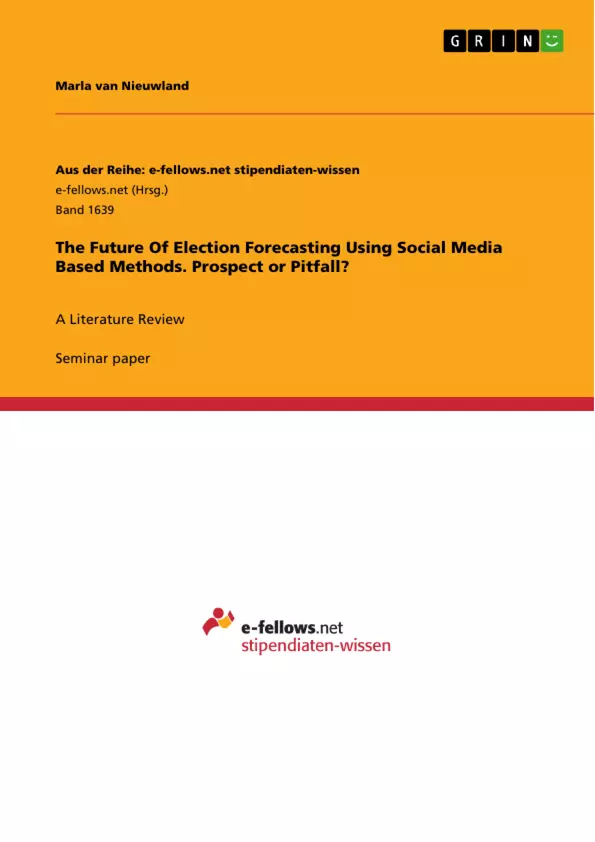In 2013 Daniel Gayo-Avello captured the state of the art regarding election prediction with social media publishing a meta-analysis, the very first one in this field of study. Concluding after an extensive literature review, that the „prevailing view [among scientists] is overly optimistic“, Gayo-Avello declares three major problems, that have to be addressed by future research: 1) The need to produce a true forecast, that is published before the election. 2) The need to take into account the biases on Twitter, especially the unrepresentativeness of the sample. 3) The need to incorporate sentiment rather than just tweet volume.
The research question of this paper is very similar to Gayo-Avello's meta-analysis, to give an overview of the current state of the art two years later, assess if the past problems and questions scientists raised have been discussed, and in the last step answer, whether or not Twitter can be used as an efficient alternative to traditional electoral forecasting.
Although two years might not be a lot of time considering the time it takes for a study to be conducted and published, the number of scientists contributing to this fairly new field of research is extremely high, therefore making much more understanding in a short time possible.
Necessarily I will only highlight a selection of studies, not being able to shed light on all studies. In a nutshell, I will take the 3 demands by Gayo-Avello as a guideline to order recent studies, then give a quick insight into the current discussion in the scientific field, and in the end come to the conclusion, that traditional polling and social media-based approaches do not have to be exclusive, but can and should be combined in future research.
Inhaltsverzeichnis (Table of Contents)
- Introduction
- Cornerstones of Research
- Recent Studies
- Scientific Community
- Conclusion
Zielsetzung und Themenschwerpunkte (Objectives and Key Themes)
The primary objective of this paper is to provide a comprehensive overview of the current state of research on election forecasting using social media based methods. This review aims to assess the progress made since a previous meta-analysis, specifically addressing the challenges and opportunities presented by this approach.
- Evaluating the efficacy of social media data for election forecasting
- Examining the challenges of bias and representativeness in social media samples
- Assessing the role of sentiment analysis in improving forecasting accuracy
- Exploring the potential for combining social media data with traditional polling methods
- Analyzing the impact of social media on electoral campaigns and public discourse
Zusammenfassung der Kapitel (Chapter Summaries)
- Introduction: This chapter introduces the topic of election forecasting using social media data, highlighting the growing use of social media platforms for political analysis and the potential for cost-effective and accessible methods. It discusses the limitations of traditional opinion polls and explores the early attempts at forecasting elections using Twitter data.
- Cornerstones of Research: This chapter outlines the key studies that have laid the foundation for research in this field, focusing on the initial attempts and the subsequent development of methodologies. It emphasizes the significance of Gayo-Avello's (2013) meta-analysis and its role in establishing a framework for future research.
- Recent Studies: This chapter analyzes recent research on election forecasting with social media, highlighting the various approaches employed by researchers. It reviews studies that have addressed the challenges of bias, sentiment analysis, and real-time forecasting. The chapter also explores the applications of these methods in different political contexts, including Pakistan, India, the UK, and Italy.
Schlüsselwörter (Keywords)
The main keywords and focus topics of this paper include election forecasting, social media analysis, Twitter data, sentiment analysis, bias, representativeness, public opinion, political campaigns, traditional polling methods, and comparative analysis. The paper investigates the potential and limitations of using social media data to forecast election outcomes and discusses the implications for research and political practice.
Frequently Asked Questions
Can social media be used for efficient election forecasting?
The paper assesses whether Twitter and other social media can serve as an alternative to traditional polling, concluding that a combination of both is most effective.
What were the three major problems identified by Daniel Gayo-Avello?
Gayo-Avello identified the need for true forecasts published before the election, the need to address sample bias/unrepresentativeness on Twitter, and the need to incorporate sentiment analysis rather than just tweet volume.
What is the role of sentiment analysis in election prediction?
Sentiment analysis goes beyond counting mentions (volume) to understand the public's actual opinion, which is crucial for increasing the accuracy of forecasts.
How does bias on Twitter affect forecasting results?
Twitter users are often not representative of the general voting population, leading to biases that scientists must account for when using this data.
Does the paper review specific country studies?
Yes, the report highlights studies from various contexts, including Pakistan, India, the UK, and Italy.
- Citation du texte
- Marla van Nieuwland (Auteur), 2015, The Future Of Election Forecasting Using Social Media Based Methods. Prospect or Pitfall?, Munich, GRIN Verlag, https://www.grin.com/document/310629



